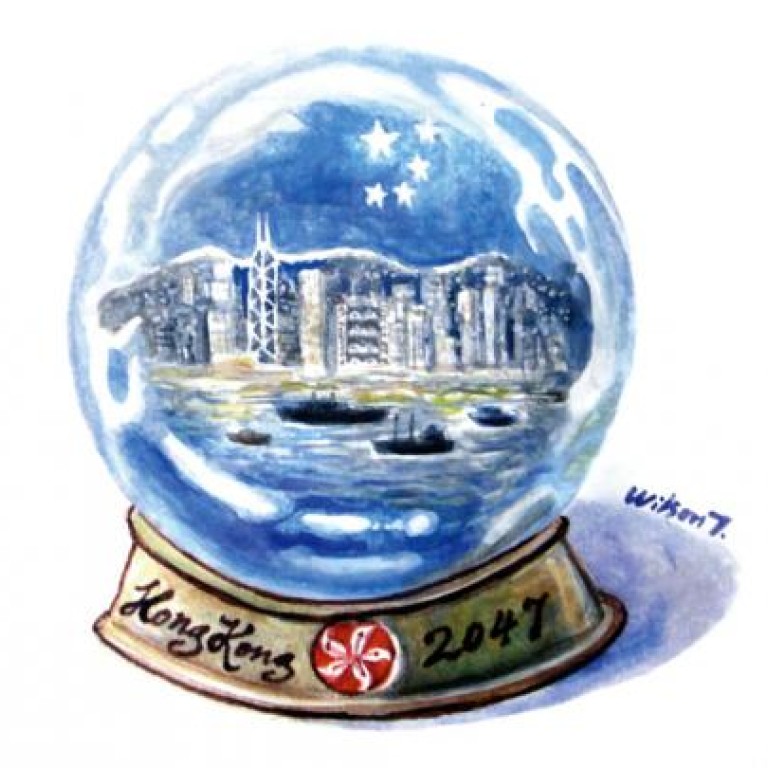
Hong Kong must honour obligations if it is to keep way of life after 2047
Grenville Cross says Hongkongers cannot take it for granted that nothing will change after 2047. If the city fails to fulfil its Basic Law obligations, Beijing might rescind 'one country, two systems'
The Basic Law is a two-way street: it enshrines residents' rights, and identifies responsibilities. Although Hong Kong's system is guaranteed for 50 years, what happens after that is unclear. The future, however, may be shaped by the way local people meet their obligations and interact with their compatriots.
When the justice secretary, Rimsky Yuen Kwok-keung, announced that the government would invite the Court of Final Appeal to consider referring the permanent residency issue to the National People's Congress Standing Committee for interpretation, some people remonstrated. The move, however, is legitimate under the Basic Law Article 158. The court itself, having heard submissions, will decide if the referral criteria are met.
The furore over Yuen's move, however, suggests that the former justice secretary, Elsie Leung Oi-sie, may have had a point when she claimed that some people in the legal world lacked a proper appreciation of the relationship between Beijing and Hong Kong. The Basic Law, of course, provides an interface between the two legal systems, and for Yuen to seek a judicial referral accords with legal precedent, as in the Congo case over the issue of state immunity. However, overreaction to Yuen's move could play into the hands of people not well disposed towards Hong Kong.
When the previous justice secretary, Wong Yan-lung, was appointed in 2005, he quickly announced that he had no plans to bring forward national security legislation. Although this played well in some quarters, it disturbed people who felt that difficult decisions should not be sidestepped. Wong, of course, had only kicked the can down the road. After all, Basic Law Article 23 requires Hong Kong to "enact laws on its own" for national security, and this duty cannot always be ducked.
Indeed, when President Hu Jintao visited Hong Kong in July, he said "it is essential to put into practice each and every provision of the Basic Law". If this was not clear enough, the deputy director of the central government's liaison office, Li Gang , said last month that Hong Kong had a constitutional responsibility to enact national security legislation. So, too, did Zhang Xiaoming , then deputy director of the State Council's Hong Kong and Macau Affairs Office and now head of central government's liaison office here.
The Basic Law, after all, is not an à la carte menu, but a package to be honoured in full. If Hong Kong does not fulfil its part of the bargain, its bona fides may be questioned come the reckoning day. The central authorities have invariably supported the "one country, two systems" principle, and if they feel let down, or otherwise dismayed at the hostility sometimes directed their way, who can blame them?
After the Lamma ferry crash, for example, Li rushed to Queen Mary Hospital to express sympathy, yet found himself criticised for upstaging the chief executive, Leung Chun-ying. Although Guangdong authorities sent four salvage ships to help out, little credit was given. Pronouncements by state leaders, designed to show national solidarity, were construed as an intrusion into local affairs.
The plan to allow non-permanent Shenzhen residents to apply for multi-entry permits for individual travel to Hong Kong, although recently deferred, triggered claims, undoubtedly resented, that Hong Kong would be "swamped" by mainland "hordes".
Moreover, the government's plan to ease the housing shortage, by developing new towns in the New Territories, has been stigmatised as creeping "mainlandisation". Although there are legitimate concerns over the effects on farming, the conspiracy theorists have conjured up a scenario in which mainlanders buy up second homes in the new towns, leading to a merger of Hong Kong and Shenzhen. Such claims undoubtedly reflect some latent antipathy towards mainlanders, which may one day be reciprocated.
At last month's City Forum, associate publisher Danny Fung Chun-chiu said slogans such as "we are Hongkongers" had tested Beijing's bottom line. Holden Chow Ho-ding, chairman of the Young Democratic Alliance for the Betterment and Progress of Hong Kong, said local people should not just think of themselves, but listen to mainland views, and he had a point.
Zhang Xiaoming also claimed that outside powers had co-ordinated campaigns for opposition parties in local elections. There seem to be real worries in mainland circles over local developments, and we should all feel concerned: the future of "one country, two systems" depends on Beijing's confidence in its efficacy.
Once serious thought is given to what will happen after 2047, Hong Kong will, if it wishes to retain its present system, need every friend in Beijing it can get. Some people, after all, have long memories, and if they recall discord and ingratitude, they may conclude that the post-1997 arrangements have failed to deliver. If the Basic Law is not fully implemented, if the central government is not trusted, and if mainlanders are not accepted, there may well be voices in Beijing which say that "one country, two systems" has had its day.
If so, this would be a tragedy, not least because Hong Kong, in its present incarnation, has much to offer China, as well as the world. It is surely incumbent upon everyone who cares for the city to live up to their responsibilities, to honour the Basic Law and to respect others. They will, thereby, hopefully ensure that Hong Kong's unique status not only survives after 2047, but goes from strength to strength.

